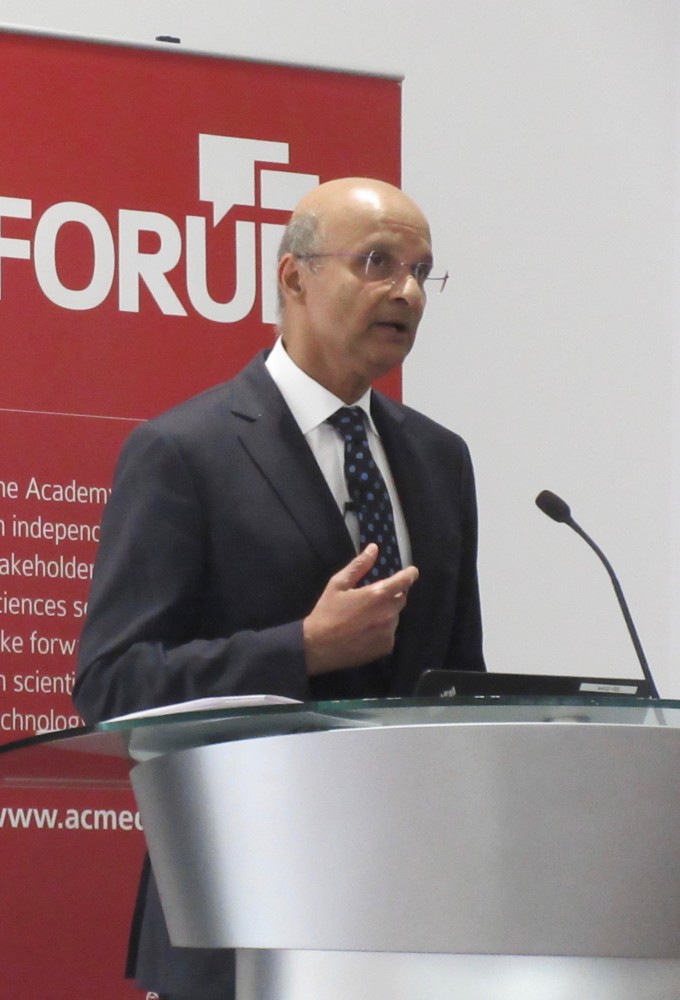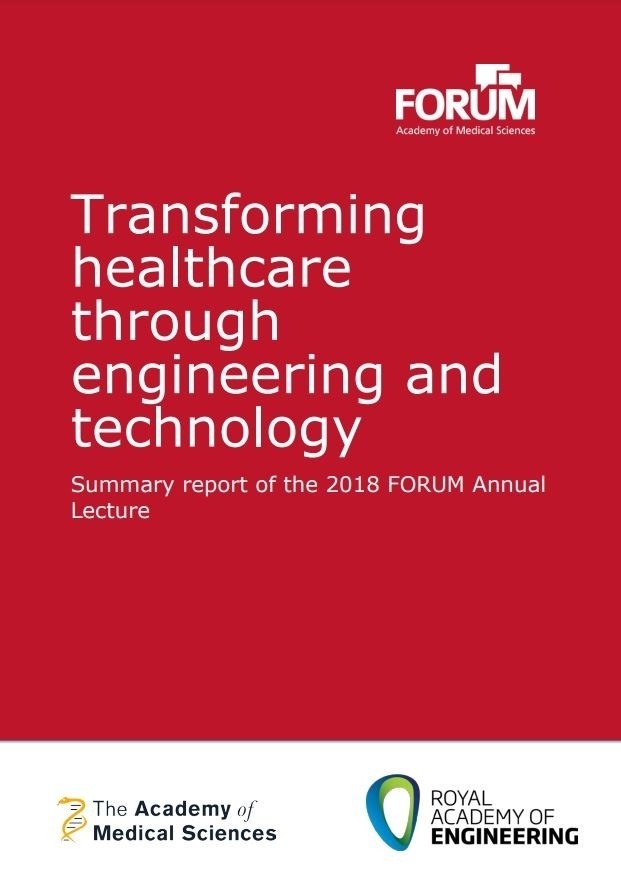15.00, Wednesday 05 September 2018
Royal Academy of Engineering, Prince Philip House, London
3 Carlton House Terrace, London, SW1Y 5DG, London
On the 5 September 2018, the Academy of Medical Sciences’ FORUM hosted its 16th annual lecture, delivered by Dr Omar Ishrak, Chairman and Chief Executive Officer of Medtronic in partnership with the Royal Academy of Engineering.
The lecture was titled 'Transforming healthcare through engineering and technology' and consisted of both a keynote lecture delivered by Dr Ishrak (pictured right) and a panel discussion. Panel participants included:
- Professor Alison Noble OB FRS FREng, Professor of Biomedical Engineering, University of Oxford
- Professor Sebastien Ourselin, Head of the School of Biomedical Engineering & Imaging Sciences, King’s College London
- Professor Lionel Tarassenko CBE FREng FMedSci, Chair in Electrical Engineering, University of Oxford
- Professor Chris Taylor OBE FREng, Professor of Medical Biophysics and Professor of Computer Science, University of Manchester
A summary report from the lecture has now been published and is available to download from the side of this page. The full lecture is also available to watch on our YouTube channel and below:
Summarized below are five key points from the event:-
- Rethinking the delivery of healthcare
Dr Ishrak illustrated how technology can better predict and prevent disease before treatment becomes necessary and how new methods of measuring successful patient outcomes must be developed in order to accurately assess the value of these new technologies to the healthcare system.
Defining “value” by comparing the relative costs of a technology and the health outcomes that matter to the patient would help construct a “value-based” healthcare system which could be more patient-centric, with focus on improving patient outcomes.
- Multimorbidity will take prevalence in healthcare
Dr Ishrak demonstrated how the upcoming challenge in healthcare is switching from a system that is designed to treat patients with acute, single cause conditions towards a system that deals more with patients affected by several health conditions at the same time; also known as multimorbidity. Such concerns were highlighted in the Academy’s 2018 international policy report.
In future, patients will need continued care in a variety of settings, from hospitals, home or hospice care. Technology will allow patients in these settings to take a more active role in the management of their own healthcare provision. As highlighted both by Dr Ishrak and the Academy’s own work on the future of data in healthcare, new systems must be developed to effectively communicate with and engage patients about their care and how they access information that is tailored to them.
- The limitations of technology
Technology can have notable impacts on how we deliver healthcare; but there are significant challenges facing the greater implementation of emerging technologies such as artificial intelligence (A.I).
If A.I. is to be used widely in the future, its effectiveness is reliant on the quality of data it is supplied with; this not only means accurate data collection by clinicians and patients but effective curation of the data and subsequent analysis. Data standards and the coding of the A.I will also play a role in the multi-part process to produce positive results.
- Collaboration between disciplines is key
Our speakers highlighted the potential for collaboration between clinicians and engineers to improve outcomes for patient and find solutions to unmet clinical needs. Dr Ishrak pointed to the development of the first battery operated and portable pacemaker, while Professor Sebastien Ourselin highlighted how EpiNav software improved patient safety and reduced the time of an operation for epileptic patients from four hours to 15 minutes.
In order to develop successful collaborations, both clinicians and engineers would need to work across domains, expanding past traditional areas of research to further develop emerging fields such as biological sensors and tissue engineering.
- The importance of data
Many of the technologies highlighted during the lecture require patient data for their development or operation. The Academy of Medical Sciences has highlighted some of the issues raised in our recent report on data-driven technologies, setting out clear principles for the development and use of technologies driven by patient data, following a series of public dialogue workshops.
These five points represent only a glimpse into the lecture, and how the engineering and medical fields can work closer together in order to drive innovation.
The 2019 FORUM Annual Lecture will take place in July, and will be on the topic of genome editing. More information will be published on our website in due course.
To find out more about the Annual Lecture, or other events in the FORUM programme further please contact [email protected]
